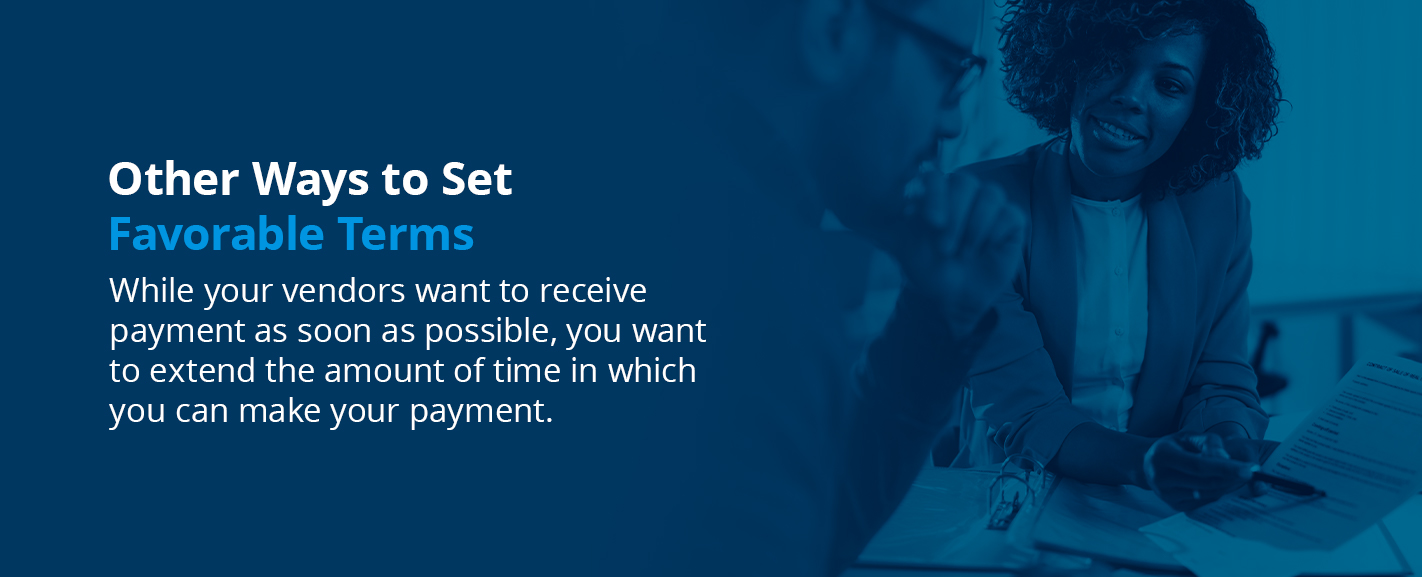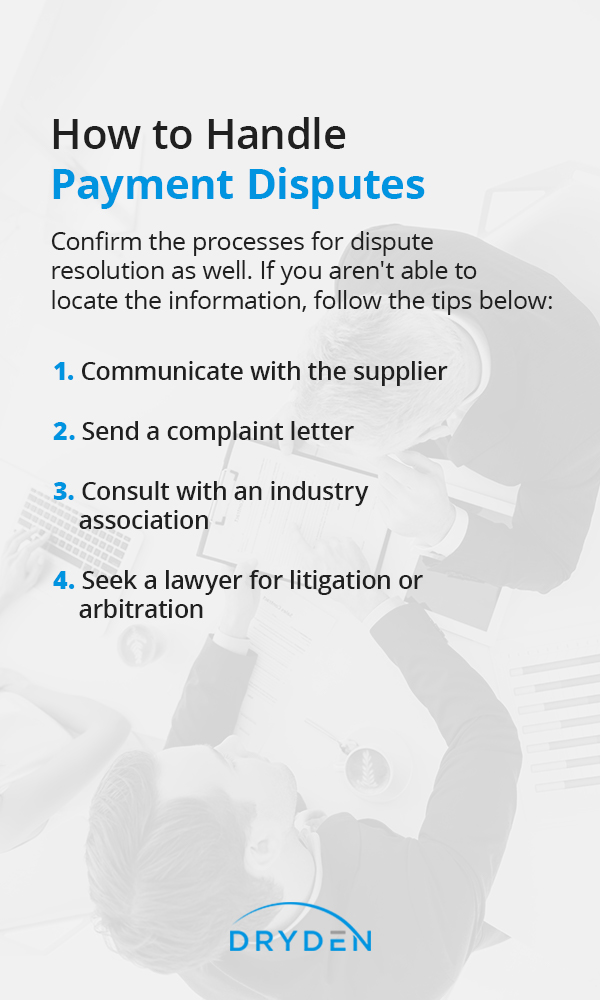Why You Should Be Negotiating Supplier Payment Terms
Last updated: August 26, 2023
As a manager or director of procurement, sourcing, purchasing or the supply chain department at a business, you know your suppliers want to be paid as soon as possible and you want to hold onto money in your business bank account. To ensure you have a successful working relationship with your suppliers and vendors, you can negotiate the payment terms.
At Dryden Group, we have developed this guide to cover how to negotiate payment terms with suppliers.
What Are Payment Terms in Procurement?
Payment terms in procurement are designated amounts of money paid to the supplier at different points in time. This process starts after the placement of a purchase order. Essentially, this is the amount of your order's value that you'll pay at different points of the production process.
The less you pay initially, the more money you'll have on hand and the less cash you'll be risking. You'll also have more leverage if there are issues with the order. The following are some of the common payment terms:
- PIA: Payment in advance
- EOM: End of month
- CIA: Cash in advance
- COD: Cash on delivery
- CND: Cash next delivery
- CWO: Cash with order
- CBS: Cash before shipment
- Net 30: Payment is required 30 days after the invoice date
- 21 MFI: 21st of the month that follows the invoice date
- Letter of credit: Documentary credit that is confirmed by the bank, used typically for export
- Net monthly account: Payment due on the final day of the month following the month in which your invoice is dated
- Documentary collection: Trade transaction in which an exporter assigns the duty of collecting payment, and the document is mailed to a bank with instructions for payment
Clear and consistent payment terms benefit the short and long-term goals of both parties in the supplier-buyer exchange. For sample orders, paying the total upfront is common, as the value is lower and this payment method gets the supplier started quickly with production and delivery. With trial orders, however, you may want to be more careful, as you may have several thousand dollars at stake. Negotiate payment terms and try to err on the side of caution, especially with new suppliers.

Advantages of Favorable Supplier Payment Terms
One way to keep cash in your business bank account that is often overlooked is setting up favorable payment terms with suppliers and vendors. Many businesses aim to keep accounts receivable low, but you should also focus on maximizing the potential of your accounts payable.
To manage accounts payable, begin by establishing payment terms. Ensure you establish clear expectations in writing beforehand, preferably in a contract that uses legal specificity to spell out payment terms. Clear expectations can help you avoid misunderstandings and legal repercussions. The best strategies and favorable supplier payment terms maximize your cash flow and stay within legal boundaries. Benefits of increasing payment terms include:
- Maximize cash flow or the cash in your business bank account for as long as possible
- Spread large payments out for longer periods while avoiding fees
- Minimize the risk of losing money, especially when starting out with a new vendor
- Gain leverage against the supplier in case of quality problems
- Build trust and a relationship with your vendor
- Streamline administrative and accounting costs, lowering operating costs of the purchasing department
The more capital your business has tied up early on in the production cycle, the more risk you are assuming if something goes wrong. If you pay the entire amount upfront, you're assuming a significant amount of risk. If your supplier unexpectedly closes shop and ceases communication with you, you may not be able to recover your money. Additionally, if issues with the product are discovered later and your business has already paid in full, you may not have much leverage to address the problem.
On the other hand, if you negotiate your payment terms and are able to withhold payment until your supplier provides a product that passes inspection, you have the leverage to request that the supplier fix any problems. Your supplier will know that if they don't fix the problems with a product, they won't get paid.
Remember that you have bargaining power. Suppliers and vendors want and need your business and will be willing to negotiate supplier or vendor payment terms, particularly if you can potentially generate a significant amount of business for them.
When Should You Set a Payment Arrangement?
When you set a payment arrangement and other payment terms may depend on the size of your company and how new the business relationship is between you and your supplier.
Set a Payment Arrangement Early
If possible, you should set a payment arrangement early. Along with delivery and price, make your payment arrangement part of the negotiations with your supplier. Simply accepting their terms without doing any negotiating may not be as favorable for your business.
Smaller and larger companies are in different positions to request modified payment arrangements. More established companies usually have increased leverage to stretch out the payment schedule due to their scale and the length of the terms they're likely to have. Regardless of the size of your company or who you're negotiating with, clearly convey that you're focusing on your cash flow and reassure the other party that your business is not in financial difficulties.
Evaluate Payment Terms Throughout Your Business Relationship
Keep in mind that a business can also adjust payment terms as the trust grows between negotiating parties. While the negotiations phase that occurs pre-order is your first opportunity to negotiate better payment terms, you can evaluate your supplier throughout the course of your partnership. Both you and your supplier may view each other as a risk when you first begin working together. As you continue your working relationship and build trust, payment terms can evolve.

Other Ways to Set Favorable Terms
You and your vendors may have conflicting goals for cash flow. While your vendors want to receive payment as soon as possible, you want to extend the amount of time in which you can make your payment. Fortunately, there are other ways you can set favorable terms.
Negotiate Longer Payback Terms
Typically, invoices are paid on receipt or in a certain amount of time after receipt. Standard terms include net 10, net 30 and net 45. The longer your payback term, the smoother your cash flow may be. If possible, negotiate longer payback terms for cash payments to suppliers. When cash flow allows, use discounts for early payments, such as paying on a quarterly basis or incorporating invoice terms like 1%/10 net 30.
Also, consider choosing non-paper payment methods that simplify bookkeeping, such as a wire transfer or automated ACH payment. These alternative payment methods can keep cash in your business bank account as long as possible. This makes suppliers happy too, as bookkeeping is simplified for everyone involved.
If you're unable to negotiate a longer payment term, particularly if the payment is due on receipt or close to it, then you may want to consider making the payment with a credit card rather than a check. Though you must pay your credit card balance monthly, charging a payment on the first day of the month means you may not have to make the actual payment for several weeks. You may even have a longer grace period.
With this method, you pay your suppliers and vendors on time while keeping your cash longer. As a bonus, depending on the credit card you choose, you can get cash back or points when using it.
Spread Out Your Accounts Payable
If you make a large payment, this can compromise your cash flow. Fortunately, when you have to make a large payment, you can choose one of two ways to negotiate more favorable terms:
- Develop appropriate terms: These terms should align with accounts receivable. In some cases, progress payments are not the best option. In this case, negotiate in writing a payment schedule that is based on project earnings. For example, you may choose to base the payment schedule on your company's project earnings during the next quarter. Ensure the payment terms are reviewed by legal counsel before you agree to them.
- Match payments to deliverables: Try to align the money put down for the work received. If you link payments to progress milestones, this can space out your payments. For instance, you may choose to pay 25% of the payment when a quarter of the work is completed, and then pay the remainder when the project is completed. Additionally, you may negotiate a larger order being delivered in smaller amounts and pay only for what you receive.
You may also want to avoid paying 100% in advance of a trial order. While this is a common practice for sample orders, you may be more cautious with trial orders.
Regularly Reviewing Your Payment Agreements
Reviewing contracts yearly can identify instances of overpaying, payments before the due date and double payments, which your company will want to avoid. So how can you resolve disputes?

How to Handle Payment Disputes
Misunderstandings can occur often in business. When reviewing your procurement payment terms, you may first want to review a contract to determine what happens when the contract is breached. Confirm the processes for dispute resolution as well. If you aren't able to locate the information, follow the tips below:
Communicate with the supplier: When you communicate with your supplier about the matter, take notes on the conversation and negotiate the agreement if possible. Establish a time frame to come up with a resolution in which a detailed email or letter is sent, and make sure a signature is required when the email or letter is received.
Send a complaint letter: Negotiation efforts to resolve a problem may be unsuccessful depending on your relationship with the vendor. In this situation, your next step is writing a detailed complaint letter. With the letter, include photocopies of essential documents, such as the purchase order. Request a reasonable turnaround time for your supplier to respond, save all correspondence and send the letter as registered mail so you can track it.
Consult with an industry association: Industry associations may help companies that need to dispute a problem with a supplier. For instance, if you work with a Certified General Accountant and want to dispute an unexpected fee, you may be able to seek help from the Chartered Professional Accountants and reach a resolution.
Seek a lawyer for litigation or arbitration: In rare, worst-case scenarios, you may want to seek legal assistance from a lawyer who can help you through litigation or arbitration. An experienced lawyer can offer legal advice that helps you navigate the next steps in the process.
Why Negotiate Payment Terms Throughout the Business Cycle?
Negotiating payment terms is in your best interest so you can defer partial payment and increase your cash flow, giving you more working capital for paying expenses, salary and investing back in the business. For instance, if you negotiate payment terms of 30/70, you can defer 70% of your balance until post-production, giving you an additional month or more to make this money work for your business.
Successful payment term negotiation skills give a company more control over cash flow and flexibility to set up new contracts with different suppliers if continued business with a partner becomes unfavorable.
At Dryden Group, we are knowledgeable specialists who can streamline the process and assist in negotiating terms between you and a potential new vendor. We can manage your indirect spend and provide a detailed analysis to ensure terms are sustainable with your business goals.

Trust Dryden Group as Your Procurement Experts
If you are a manager or director of procurement, sourcing, purchasing or a supply chain department, you deserve to partner with a procurement expert you can trust. At Dryden Group, we have been in business for more than 20 years. We have worked with some of the largest organizations in the industry, and we have gained expertise from commodity managers. We can help you manage:
- Benchmarking
- RFP management
- Spend assessment
- Audit and compliance
- Program optimization
- Contract negotiations
- Advisory services
- Lab supplies procurement
- Print procurement services
- Office supplies procurement
- MRO procurement consulting
- Mergers and acquisitions services
- Supplier relationship management
Your bottom line is our top priority. With Dryden Group, you can get the protection needed for your bottom line. We manage contract drafting, conflict resolution and reviews so you don't have to. Contact us at Dryden Group today to learn about our procurement consulting services, including supplier sourcing and negotiating.
Sources
- https://drydengroup.com/common-contract-issues-business/
- https://drydengroup.com/services/procurement-audits/
- https://drydengroup.com/services/indirect-procurement-benchmarking/
- https://drydengroup.com/services/program-optimization/
- https://drydengroup.com/services/rfp-management/
- https://drydengroup.com/services/spend-analysis/
- https://drydengroup.com/services/mergers-acquisitions/
- https://drydengroup.com/services/advisory-services/
- https://drydengroup.com/services/supplier-relationship-management/
- https://drydengroup.com/services/contract-negotiation/
- https://drydengroup.com/services/lab-supplies/
- https://drydengroup.com/services/print-procurement/
- https://drydengroup.com/services/mro-procurement-consulting/
- https://drydengroup.com/services/office-supplies-procurement/
- https://drydengroup.com/contact-us/